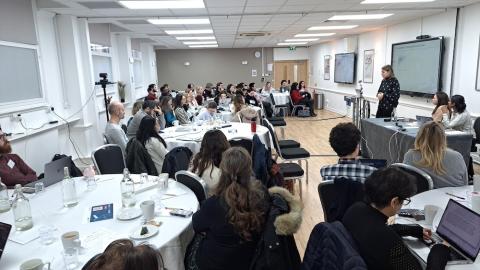The technologies and methods we use to study the brain are advancing at a rapid pace, and with it, the amount of data that is generated. From genetics to lifestyle factors, brain imaging to blood composition, we now have access to all types of data, and an unprecedented scale. But to truly unlock the potential of this growing resource, we must be able to manage and exploit data to reveal insights. This is where data science skills and specialist data scientists and bioinformaticians are essential to our mission to transform the lives of people living with or at risk of dementia and associated neurodegenerative conditions
At the UK DRI, we aim to be agile. This means we want our researchers and global collaborators to rapidly, and easily access and share data with one another, while ensuring that data remains secure across the pipeline. In order to achieve this, we empower our researchers to deliver data-driven solutions through five fundamental framework pillars, enabled by a dedicated UK DRI Core informatics team.
Active projects we're involved in include:
- HxC: Healthier Science through Collaboration - aiming to amplify the voices of interdisciplinary scientists from diverse backgrounds
- Initiative for FAIR spatial data (IO-FAST) – IO-FAST aims to democratise spatial omics data to enable the community to share and (re)use spatial data in a FAIR manner.

UK DRI researchers take part in a bioinformatics workshop
Latest news



Data science framework
Five fundamental pillars allows out rearchers to deliver data-driven solutions
- Data democratisation
Empowering every UK DRI researcher to maximise their data analyses and making UK DRI data accessible and interpretable to the widest range of stakeholders.
Ensuring that all researchers can fully analyse and share their own data as well as others. The UK DRI Core Informatics team is developing standardised data processing pipelines available to all UK DRI researchers, ensuring consistent data processing across the Institute. We also seek to establish standards across the dementia research community to ensure interoperability. We have partnered with the Alzheimer’s Disease Data Initiative (ADDI) to host the UK DRI standardised data processing and analysis on the ADDI Workbench, allowing broad access to data and promoting Open Science. This collaboration enables all dementia researchers worldwide to access high-quality UK DRI data and provides an online workbench where they can reanalyse our data and combine it with their own, ensuring access and immediate reusability without the need for local compute infrastructure.
- Data integration
Facilitating the harmonisation, access and utilisation of heterogeneous data types across the UK DRI.
With the huge complexity inherent in studying neurodegenerative disease, it is essential to integrate diverse data types to reveal deeper insights. The UK DRI is establishing a graph network using neo4J technology to map relationships between traits, genetics, and other molecular data. This approach enhances the data interpretation, particularly for AI/ML applications, while making the integrated data easily accessible for researchers at all levels.
- Access & representation
Promoting equitable access and inclusive representation in data and resources, fostering a collaborative and diverse research environment within the UK DRI and beyond.
Data from diverse populations hold immense value in shaping our understanding of society. Homogeneous or biased data sources limit our understanding of complex social, economic, and health-related issues. We ensure that the datasets we use in our initiatives are as representative of the general population as possible, such as the Global Parkinson’s Genetics Program (GP2), which specifically aims to include groups traditionally underrepresented in genetics research. We also prioritise data literacy and education programmes and aim to empower individuals with the skills and knowledge necessary to navigate, interpret and utilise data effectively through placements such as In2ScienceUK.
- Training
Developing the skills and expertise needed to conduct effective data science research.
Through our informatics training programme, we offer UK DRI researchers the skills to effectively use data processing platforms and design experiments. Additionally, in collaboration with external partners like EMBL’s European Bioinformatics Institute, we provide tailored training courses, such as the “Data-driven approaches to understanding dementia”, which was delivered in April 2024 to an international cohort of participants.
- Partnerships
Collaboration is at the heart of the Institute’s strategy. The UK DRI has strong existing partnerships with key organisations such as Health Data Research UK, DEMON Network, Dementias Platform UK, and the Alan Turing Institute to foster knowledge exchange. We seek partners with complementary resources, such as data, infrastructure, tools, and software that can be shared to enhance our research capacities.
HxC: Healthier Science through Collaboration
This project aims to amplify the voices of interdisciplinary scientists from diverse backgrounds, with the goal of fostering positive and sustainable culture change by embedding good practices within research teams and organisations.

